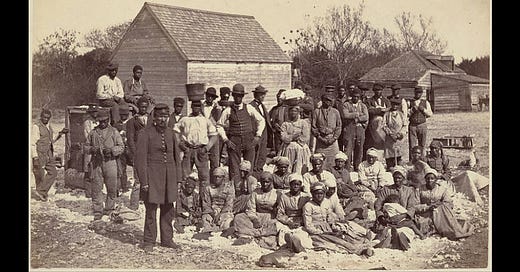In June of 2021, President Joe Biden signed legislation into law that made Juneteenth (short for “June Nineteenth”) a federal holiday. But sadly, most Americans know little about the historical context behind why the day is commemorated.
So here’s a bit of backdrop:
On June 19th, 1865 federal troops took hold of Galveston, Texas, the last Confederate holdout, a move that ensured the freedom of all enslaved Americans. But what few of us are aware of is that emancipation of Black slaves began two and a half years earlier than that, on January 1, 1863, with the Emancipation Proclamation issued by President Abraham Lincoln.
In short, it was nearly a year and a half before Black slaves in Texas knew they were free!
According to the historical narrative, many planters and other slaveholders migrated to Texas from Eastern states in order to find a safe haven from the fighting and to mitigate the growing problem of slaves fleeing. This boosted Texas’ enslaved population from 182,000 at the start of the Civil War to an estimated 250,000 by the end.
Initially, the Lone Star State, the most remote of all the slave states, had too few Union troops at the end of the Civil War to enforce the Emancipation Proclamation presidential order. But on June 19th, Union General Gordon Granger arrived with his troops in Galveston, Texas with news that the Civil War was over and slavery had been abolished.
In announcing General Order No. 3, Granger stated
"The people of Texas are informed that, in accordance with a proclamation from the Executive of the United States, all slaves are free. This involves an absolute equality of personal rights and rights of property between former masters and slaves, and the connection heretofore existing between them becomes that between employer and hired labor. The freedmen are advised to remain quietly at their present homes and work for wages. They are informed that they will not be allowed to collect at military posts and that they will not be supported in idleness either there or elsewhere."
Yet even after June 19th, blacks were subjected to lynchings, harassment, and even murders by local whites, who considered Granger’s orders an affront to white landowners who faced losing unpaid Black labor. Many saw the pronouncement not only as a destabilizing force for the economic engine of slavery but also as a challenge to their prevailing racist view of Black as an inferior class of people who were now being elevated to their political equals.
With the ushering in of Juneteenth, some slaves in the state reported to Granger and other Union authorities that they were still being held in bondage. Moreover, slavery was also still being legally practiced in the Union border states of Delaware and Kentucky for another half a year. Then on December 31, 1865, the Thirteenth Amendment of the Constitution was ratified abolishing chattel slavery throughout the country.
On June 19, 1866, the one-year anniversary of Granger’s arrival, freedmen in Texas organized the first Juneteenth celebration, which they affectionately called “Jubilee Day,” a reference to the ancient Jewish practice of freeing slaves and forgiving debts every fifty years.
Today, Juneteenth is considered the longest-running, distinctly Black American holiday. In the ensuing years, Juneteenth events commonly featured family outings, music, prayer services, and other celebratory activities. And while Juneteenth started as a Texas celebration, with the Great Migration of Black people across the nation in the early twentieth century, it continues to be commemorated across a growing number of cities in the U.S.
Today, Juneteenth symbolizes new hope for not only Black people but all Americans in a nation predicated on freedom and justice for all. Moreover, it offers an opportunity for all of us to explore Black contributions to the history of freedom.
Turning The Page On Freedom
A book by Pulitzer Prize-winning historian Annette Gordon-Reed entitled “ On Juneteenth” offers a striking historical exegesis of this day of commemoration. Weaving together American history and profoundly moving family narrative and memoir, Gordon-Reed’s “On Juneteenth” examines the difficult hardships that Black Americans have endured in the century since, from Reconstruction through Jim Crow and beyond.
By chronicling the rich history of cowboys, ranchers, and oilmen that have long dominated the lore of the Lone Star State, Gordon-Reed, herself an East Texas native and slave defendant brought offers a fresh, deeply clear look at her home state and the implications it has had on the Black historical trajectory.
Gordon-Reed writes in a very accessible, easy-to-read style that easily draws you into her message. The book contains an ocean of interesting historical background and facts that provides a brilliant background on Juneteenth’s important contribution to Black History.





Forgot to attach the screen shots, but can’t through comments. Do will through Restack with a note!